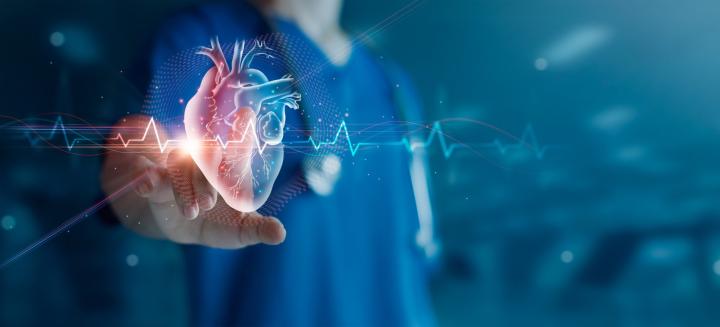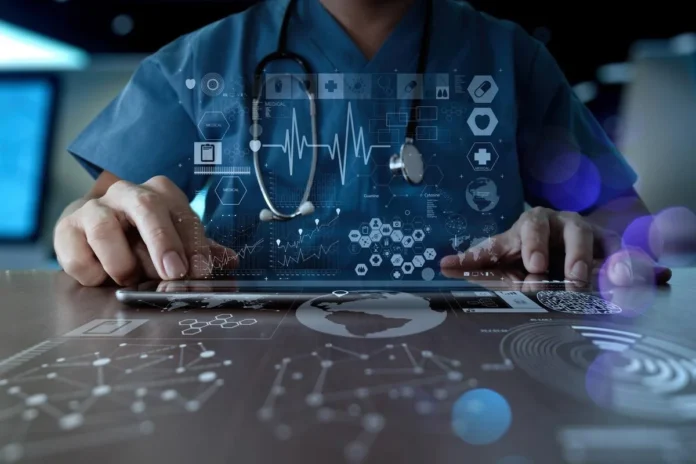The total influence of artificial intelligence on health and wellness technology still needs to be discovered. Now, more and more businesses are developing innovative ways to apply it. The world is evolving every instant with new technologies and inventions. The same goes for the field of medicine and health.
Understanding and implementation in the health department are becoming advanced as technology evolves daily. Additionally, an increasing number of wellness businesses have been promoting the use of AI in their products and apps. Some apps monitor blood flow under our skin to assess our blood pressure and mirrors that promise to tell us how old we appear. But are we eventually getting healthier gratitude for AI-powered health tracking?
Outside of the news, clinical medicine has received a more significant share of the attention surrounding AI health than customer technology. Physicians and scientists view artificial intelligence (AI) as a potentially life-saving diagnostic tool that can identify cancer and other dangerous diseases earlier. According to the US Food and Drug Administration, AI has numerous approved medical uses. (However, as of its most recent upgrade, on October 19, 2023, no “generative” AI usage had been authorized.)

Full-body AI scans are a new type of MRI currently available to those interested in obtaining an interior view of their entire body. Its firms claim to be able to diagnose cancer, aneurysms, liver disease, and other life-threatening disorders more quickly. However, many medical professionals feel that this model isn’t nearly ready for general usage, mainly because it differs from conventional medicine’s standard “risks versus benefits” analyses.
The effect of AI on people’s wellness outside clinics still needs to be more precise. You might get the impression that there’s always a symptom or health metric you need to monitor due to the increase of apps and trackers that claim to provide information about your health that you wouldn’t otherwise know. Of course, this is assuming the readings are accurate in the first place. The purpose of the use of these apps needs to be adequately understood for better results of outcomes and their utilization.
What you’re looking for, whether the technology can extract significant information from health data, and what you do with that knowledge afterward will determine how helpful all of this is. Suppose it keeps going in the same direction as more conventional activity monitors. In that case, they might provide a modest boost to your health. A systematic review published in The Lancet in 2022 claims exercise tracking has some genuine health advantages. Activity trackers are essential, but not all forms of health tracking require you to be active.
Dr. Maame Yaa Yiadom, an associate professor of emergency medicine at Stanford University and head of an AI research group, observed that the discussions ended with the tech. Technology is only as good as it helps people through a journey with their healthcare providers, according to Yiadom. She said this includes screening, diagnosing, developing a treatment plan, and improving one’s health.
Here’s a look at some of the more recent wellness applications and technologies that either address the underlying causes of our health or provide a level of innovation that standard health trackers still need to be able to match.

Can an app be used to discover the “silent killer”?
Renee Dua, a renal specialist in the San Fernando Valley, is the creator of the app Together by Renee. She began creating Together (a health monitoring application) to act as a “health assistant” after taking on her father’s care following his illness. Like other wellness applications like Apple’s Health app, Together aims to gather shared health data and simplify the process of monitoring wellness.
The software employs artificial intelligence (AI) to accomplish some of the tasks that prior technology has long performed, such as medication tracking and providing specific heart health data, such as blood pressure. It is often called the “silent killer” because it lacks noticeable signs. According to Dua, taking a long selfie (holding your phone up for 60 seconds) is how you do this test. It allows intelligence “on the back end” of your phone to extract specific health indicators by analyzing the color spectrum of your skin.
Moreover, it assesses your “mental wellness” using voice tracking, a method that AI increasingly uses to search for health-related data. The Together app will score your vocal smoothness, control, liveliness, energy range, clarity, crispness, speech rate, and pause duration after you record a 30-second voice memo.
Dua stated that by hearing the intonations in the sound of your spokesperson, they can see if you’re tense or depressed. She gave an example of how you may determine whether anxiety is the cause of your high blood pressure by integrating all the health measurements into a single app.
She shared an experience. She stated that I used the Together app and a typical pharmacy blood pressure machine (a Higi at RiteAid) to take my blood pressure simultaneously. According to this gadget, I had a pulse rate of 64 and a 107/69. With a pulse rate of 67, the app recorded 96/66. I want a change because precise blood pressure measures must be taken frequently while adhering to the monitor’s strict guidelines. (Note: This is by no means an excellent research or comparison. You would need readings taken over several days to compare home blood pressure readings more accurately.)
According to Dua, the FDA has been notified that the third-party software utilized on the Together app to track vital signs, including blood pressure, has been approved. If clearance is granted, the app may identify health data compared to other devices.
But if you know you have high blood pressure, this shouldn’t replace a blood pressure monitor that your doctor has advised. It is extra data that you can use to increase your fitness portfolio. It is much like the data you can download in PDF format from an Apple Watch or the sleep data you can zap to your therapist once it’s collected on an Oura ring.
Dua asked that we not try to replace your doctor in any way; instead, we are just guiding you on how our app should be used.
AI is experimenting in unexplored areas of health tracking.
AI exploding hidden areas of health tracking
Though it wasn’t at the top of your gadget wish list, the app that measures your cough volume is an excellent illustration of how AI is expanding pattern recognition into more wellness-related domains.
There are two sorts of coughs that you may typically describe to a doctor: “productive” coughs, which produce phlegm, and “unproductive” coughs, which are dry.

An app has recently been developed to measure how much you cough during the day. Cough Tracking is the product of Hyfe AI. The company released studies indicating that it’s measuring up to accuracy criteria and identifying people who cough frequently and would benefit from further examinations. I don’t know if the app can locate milder symptoms because when I had it up, it only counted the coughs I intentionally produced. The app did not pick up little throat clearings or quieter coughs (I used the app without being ill.) Nevertheless, given the link between cough frequency and underlying health issues, companies entering the home health space with cough-tracking technology may find value.
Activity trackers might become more beneficial with the help of AI. Whoop and sleep tracking, for instance, could improve data insight. Another app that utilizes AI to provide blood sugar and nutrition insights when paired with a continuous glucose monitor (a device that is becoming increasingly popular in the wellness industry) is called January.
AI in Hospitals to detect heart attacks
Every second counts and is very important when someone arrives at the emergency room with signs of a heart attack. According to Yiadom, emergency departments have 10 minutes to diagnose a patient with a heart attack, so that’s six hundred of them.
Yiadom and her team developed a predictive AI model to assist emergency department personnel in “getting the right patients the right tests” while they are still in the waiting room to narrow down on those critical minutes. The objective is to detect more heart attacks, expedite diagnosis, and save more lives.
The predicted model has performed well thus far. This summer, a study on historical medical records and patient diagnoses was published in the journal Diagnostics. The prediction model did better than emergency room staff regarding the number of heart attacks it missed—17% as opposed to 27%. When human programming was combined with computer programming, performance outperformed both: 10% more heart attacks were found.

According to James Zou, an assistant professor of biomedical data science at Stanford University, the growing use of AI in medicine demonstrates how algorithms are “driving from study into exercise,” even though it’s not quite consumer technology. In a study in which Zou took part, the use of insurance claims to determine the applications of AI devices in hospitals was found to be most prevalent in assessing diabetic retinopathy and coronary artery disease.
Zou wrote in his email that most of the FDA-cleared AI models have yet to be used much. We are still in the premature phases.
Your health knowledge is increased. What’s next?
Dr. Ethan Goh, a physician, and researcher at Stanford University focused on artificial intelligence, says that given the “significant gap” that still exists between what people are dealing with and how to handle it, it makes sense for people to keep investing in technology, whether or not it is referred to as AI. Furthermore, enormous language models (ChatGPT, for example) and other generative AI tools offer “advanced personalization and concentration.” Many people need and desire that combination regarding their health care.
According to Goh, another crucial point to remember when discussing AI is that it’s sometimes utilized as “just a buzzword.”
According to a 2022 article in The Journal, Goh said that Research shows that most health apps that use AI chatbots use rule-based procedures and limited circumstances dialogue management that depends on leading users through predetermined paths to respond. The authors noted that, among other things, some of the apps they evaluated made claims about “AI” but offered no further information about the underlying technology.
However, the best wearables and apps won’t do anything for your health if you don’t use the information they provide. According to Samantha Kleinberg, an associate professor at Stevens Institute of Technology and AI researcher, the sweet spot of health applications and other wellness technology may be in connecting the dots and altering your behavior to be more advantageous to you.
Kleinberg stated that Frequently, more data is required to provide context for the values you’re receiving. That usually takes some work for individuals to track. For the time being, the application of AI in healthcare is more dependent on how it is applied than on the data or metrics perse.
This article’s content is not meant to be used as medical or health advice; it is solely educational and informative. Any queries concerning a medical issue or your goals for your health should always be directed toward a doctor or other certified health expert. It would help if you never went with any online guidelines because your health is compassionate, and it needs to be dealt with delicately and adequately under the supervision of a medical specialist instead of any online research or study.




